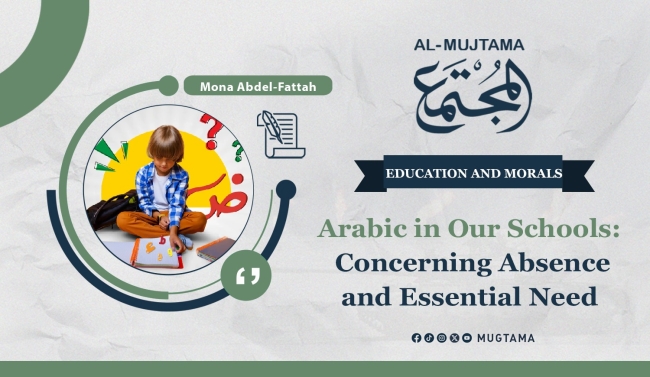Arabic in Our Schools: Concerning Absence and Essential Need
It is impossible to underestimate the significance, value, and role of educational institutions—be it a nursery, school, institute, college, university, or other modern forms such as educational platforms—in advancing the Arabic language and fortifying its defense against foreign languages, dialects, and new terms, words, and phrases alien to the Arabic lexicon.
Needless to say, the school is the primary vessel for the Arabic language and the main cradle for instilling the identity of a nation that, unfortunately, now struggles to preserve its language. A language whose speakers feel ashamed to use it, mock it, or are led to do so deliberately to shed the mantle of a great, ancient, and deeply rooted language that is the tongue of the Qur'an.
I recall how, decades ago, our schools echoed with morning broadcasts filled with speeches, songs, segments, and competitions in classical Arabic. This practice extended from one lesson to another, from one teacher to the next—whether during literature and poetry lessons, composition, Islamic studies, or even science and math classes. The use of classical Arabic was present, whether by the teacher or the student.
The same applied to school seminars, educational activities, and regular competitions, such as decorating classrooms with posters bearing poetic verses and wise sayings from heritage, school journalism exhibitions, ideal student competitions, and more. The Arabic language held a dominant presence, claiming the largest share of daily practice in reality.
This intensive and active presence provided students with several language skills. The first was listening skills, enabling students to learn Arabic correctly. Historically, Arabs ensured their children were raised in rural areas to protect their language from being influenced by non-Arabs.
The second skill was speaking, enabling clear and correct pronunciation and effective expression of thoughts.
The third skill was reading, which enriched the student’s vocabulary.
The fourth skill was writing, which allowed for self-expression—the most vital function of language. This comprehensive acquisition of listening, speaking, reading, and writing skills shaped a well-rounded linguistic competence.
A specialized Jordanian study titled "The School and Its Role in Acquiring Language Skills" highlighted the necessity of allocating time within lessons for listening, including reading evaluations in monthly assessments, encouraging students to write words and varied topics from an early age, and ensuring the curriculum integrates conversation and communication skills. These elements complement each other and cannot be neglected.
Cooperative Learning
A Western study conducted on Dutch school students emphasized the importance of teachers encouraging verbal interaction among students, urging them to accept others' opinions, write personal comments, and provide opportunities for primary students to practice oral and written expression. This aligns with what is known as the cooperative learning strategy.
Algerian academic Dr. Daloum Mohamed noted that everything in a child's life serves as a school for the Arabic language: the mother, the street, the city, and the school in its broader sense. The moment a student steps into a school, everything presented to them should be in Arabic, from administrative matters to the school staff.
However, the use of Arabic in schools and universities across many Arab and Islamic countries has become alarmingly absent. Frankly, its presence is often timid, rarely resonating in practice. Even Arabic language teachers themselves sometimes avoid using it and may face ridicule and bullying if they insist on speaking it!
This unfortunate reality calls for urgent action. Practical measures, plans, and programs must be adopted by relevant ministries and authorities, requiring Arabic teachers to use the language as a first step. The grades awarded for Arabic should be elevated, prioritizing it over other subjects. This should be supported by educational activities that promote Arabic, competitions with valuable prizes to encourage students to refine their language, and efforts to curb linguistic duality among children and adolescents of both genders. Additionally, the production of artistic and cinematic works that reinforce the value of classical Arabic among Arabic-speaking peoples is necessary.
Through practical and educational practice in an Arabic-speaking environment, schools can enhance students’ linguistic skills. This includes ensuring students master grammar, morphology, and spelling rules, perfect Arabic calligraphy, and access tools and resources that support the application of language skills in schools. Organizing cultural competitions and activities to elevate students’ proficiency in language skills, allowing students to speak, ask questions, engage in dialogue, recite poetry, write stories, record their ideas and observations, and summarize what they read in writing after each language lesson are vital steps. Restoring the importance of dictation, composition, and literature lessons, and considering the use of classical Arabic as a mark of excellence among students, are equally essential.
If we are serious about saving our language and advancing it, we must speak it.
-------------------------------------------------------------


